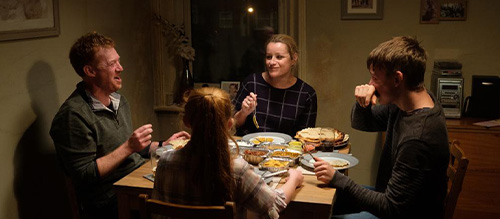Sorry We Missed You (2019) Review
Sorry We Missed You (2019)
Director: Ken Loach
Screenwriter: Paul Laverty
Starring: Kris Hitchen, Debbie Honeywood, Katie Proctor, Rhys Stone
Ken Loach has returned to the big screen with his latest intimate drama to tell of the woes of a generation, the all-time great filmmaker behind the likes of Kes (1969) and I, Daniel Blake (2016) taking his always uniquely personal sword away from the government fronted failings of the UK to international big business and its unwarranted exploitation of a workforce battling ever decreased workplace rights in a bid to make some semblence of money in a gig economy failing the working class. Sorry We Missed You is, very much like its predecessor I, Daniel Blake, a timely evaluation of unspoken cultural and national truths that speaks of an international crisis through some of the most delicately handled yet intimate filmmaking available to such a wide audience in today’s hemogenised landscape of big budget and high concept films; a reminder of why we need filmmakers like Loach as much as it is a testing piece of societal deconstruction that never loses touch of its humanistic heart.
Kris Hitchen plays a working man seducted into the world of what is explained to him as self-employment whose promises of going from rags to riches are told to be as fantastical as the notion itself, the husband and father of two children imprisoned to a life of 16 hour work days and financial repurcussions for ever being absent from his new job becoming an ever-increasing strain as his family life spirals out of control and to the brink of total disaster.
The work Ken Loach produced in conjunction with screenwriter Paul Laverty for the pair’s previous offering I, Daniel Blake painted an inhumane picture of the working class in times of struggle, the Newcastle setting acting almost as a blanket-location for issues felt across the United Kingdom and particularly in the North. Sorry We Missed You is carefully targeted to assume the same locale, the director himself stating how the message this sent was one of “it could be happening to anyone, anywhere”, how in this community there aren’t only the impoverished unemployed but there are also the empoverished employed.
Sorry We Missed You gains some kind of advantage over I, Daniel Blake in its universality from how it looks to explore a younger protagonist and, moreso, the family dynamic of a family with working parents. Where I, Daniel Blake seemed lost upon some of its audience was in the film’s presentation of characters that those not already associated with such characters would find hard to identify with, whereas Sorry We Missed You stares the working everyman in the face and asks: is this fair?
To bid eyes upon a film like Sorry We Missed You and not feel some degree of sympathy for a man unprotected by the very system he unwittingly supports through the pride he holds towards himself as a man who has, in his words, “never been to the job centre”, must be impossible; the empathy driven into his character and those closest to him paying fruit with some of the most empathetic narrative beats imaginable, this tale – lacking in fantasy or set pieces – being so much more soul crunching per the result.
If Sorry We Missed You were to be summarised in one particular moment, it would be the working father of a family of four pushing an undersized bike up-hill and past a number of industrial bins reading “human waste only”, the stunning visual cue from one of the country’s most prominent auteurs reasserting how Loach’s work is not only intensely character-driven on the page but quietly artistically assured on the screen too.
In 2016, I, Daniel Blake was “our quiet rage”. In 2019, Sorry We Missed You is an impassioned cry for help. More than a movie, it is a voice for those without one from a filmmaker who now seems to be the last bastian of such filmmaking, an 83 year old 50+ year veteran of the screen we must all cherish; his latest movie being one of the most affecting pieces of cinema seen on any screen in recent years.
23/24


